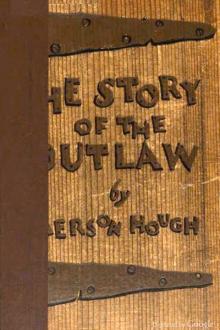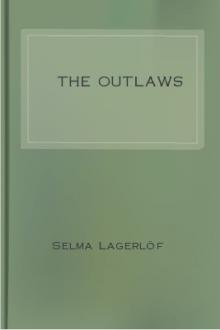The Story of the Outlaw, Emerson Hough [ereader that reads to you txt] 📗

- Author: Emerson Hough
- Performer: -
Book online «The Story of the Outlaw, Emerson Hough [ereader that reads to you txt] 📗». Author Emerson Hough
Mr. Herbert M. Tonney, now a prosperous citizen of Flora, Illinois, was a resident of that portion of the country in the stirring days of the land boom, and became involved to an extent beyond his own seeking in this county seat fight. While serving as an officer of the peace, he was shot and left for dead. No story can serve so well as his personal narrative to convey a clear idea of the causes, methods and results of a typical county seat war in the West. His recountal follows:
"I do not need to swear to the truthfulness of my story, for I have already done so in many courts and under the cross-examination of some of the ablest lawyers in the country. I have repeated the story on the stand in a criminal case which cost the United States government more money than it has ever expended in any similar trial, unless perhaps that having to do with the assassination of President Lincoln. I can say that I know what it is to be murdered.
"In March, 1886, I moved out into southwestern Kansas, in what was later to be known as Stevens county, then a remote and apparently unattractive region. In 1885 a syndicate of citizens of McPherson, Kansas, had been formed for the purpose of starting a new town in southwestern Kansas. The members were leading bankers, lawyers, and merchants. These sent out an exploration party, among which were such men as Colonel C. E. Cook, former postmaster of McPherson; his brother, Orrin Cook, a lawyer; John Pancoast, J. B. Chamberlain, J. W. Calvert, John Robertson, and others. They located a section of school lands, in what was later known as Stevens county, as near the center of the proposed county as the range of sand dunes along the Cimarron river would permit. Others of the party located lands as close to the town site as possible. On August 3, 1886, Governor Martin issued a proclamation for the organization of Stevens county. It appeared upon the records of the State of Kansas that the new county had 2,662 bona-fide inhabitants, of whom 868 were householders. These claimed a taxable property, in excess of legal exemptions, amounting to $313,035, including railroad property of $140,380. I need not state that the organization was wholly based upon fraud. An election was called for September 9, and the town of Hugoton—at first called Hugo—was chosen.
"There can be competition in the town-site business, however. At Mead Center, Kansas, there resided an old-time Kansas man, Colonel S. N. Wood, who also wanted a town site in the new county. Wood's partner, Captain I. C. Price, went down on July 3 to look over the situation. He was not known to the Hugoton men, and he was invited by Calvert, the census taker, to register his name as a citizen. He protested that he was only a visitor, but was informed that this made no possible difference; whereupon, Price proceeded to register his own name, that of his partner, those of many of his friends, and many purely imaginary persons. He also registered the families of these persons, and finally—in a burst of good American humor—went so far as to credit certain single men of his acquaintance with large families, including twenty or thirty pairs of twins! This cheerful imagination on his part caused trouble afterwards; but certain it is that these fictitious names, twins and all, went into the sworn records of Hugoton—an unborn population of a defunct town, whose own conception was in iniquity!
"Price located a section of government land on the north side of the sand hills, eight miles from Hugoton, and this was duly platted for a town site. Corner lots were selling at Hugoton for $1,000 apiece, and people were flocking to that town. The new town was called Woodsdale, and Colonel Wood offered lots free to any who would come and build upon them. Settlers now streamed to Woodsdale. Tents, white-topped wagons and frail shanties sprung up as though by magic. The Woodsdale boom attracted even homesteaders who had cast in their lot with Hugoton. Many of these forgot their oaths in the land office, pulled up and filed on new quarter sections nearer to Woodsdale. The latter town was jubilant. Colonel Wood and Captain Price, in the month of August, held a big ratification meeting, taunting the men of Hugoton with those thirty pairs of twins that never were on land or sea. A great deal of bad blood was engendered at this time.
"Soon after this Wood and Price started together for Garden City. They were followed by a band of Hugoton men and captured in a dugout on the Cimarron river. Brought back to Hugoton, a mock trial was held upon them and they were released on a mock bond, being later taken out of town under guard. A report was printed in the Hugoton paper that certain gentlemen of that town had gone south with Colonel Wood and Captain Price, 'for the purpose of a friendly buffalo hunt.' It was the intention to take these two prisoners into the wild and lawless region of No Man's Land, or the Panhandle of Texas, there to kill them, and to bring back the report that they were accidentally killed in the buffalo chase. This strange hunting party did go south, across No Man's Land and into the desert region lying around the headwaters of the Beaver. The prisoners knew what they were to expect, but, as it chanced, their captors did not dare kill them. Meantime, Woodsdale had organized a 'posse' of twenty-four men, under Captain S. O. Aubrey, the noted frontier trailer, formerly an Indian scout. This band, taking up the trail below Hugoton, followed and rescued Wood and Price, and took prisoners the entire Hugoton 'posse.' The latter were taken to Garden City, and here the law was in turn set at defiance by the Woodsdale men, the horses, wagons, arms, etc., of the Hugoton party being put up and sold in the court to pay the board of the teams, expenses of publication, etc. Colonel Wood bought these effects in at public auction.
"By this time, Stevens county had been organized and the Hugoton 'pull' was in the ascendency. A continuance had been taken at Garden City by the Hugoton prisoners, who were charged with kidnapping. The papers in this case were sent down from Finney county to the first session of the District Court of Stevens county. The result was foregone. Tried by their friends, the prisoners were promptly discharged.
"The feeling between the two towns was all the time growing more bitter. Cases had been brought against Calvert, the census-taker, for perjury, and action was taken looking toward the setting aside of the organization of the county. The Kansas legislature, however, now met, and the political 'pull' of Hugoton was still strong enough to secure a special act legalizing the organization of Stevens county. It was now the legislature against the Supreme Court; for a little later the Supreme Court declared that the organization had been made through open fraud and by means of perjury.
"Naturally, trouble might have been expected at the fall election. There were two centers of population, two sets of leaders, two clans, separated by only eight miles of sand hills. There could be but one county seat and one set of officers. Here Woodsdale began to suffer, for her forces were divided among themselves.
"Colonel Wood, the leader of this community, had slated John M. Cross as his candidate for sheriff. A rival for the nomination was Sam Robinson, who owned the hotel at Woodsdale, and had invested considerable money there. Robinson was about forty years of age, and was known to be a bad man, credited with two or three killings elsewhere. Wood had always been able to flatter him and handle him; but when Cross was declared as the nominee for sheriff, Robinson became so embittered that he moved over to Hugoton, where he was later chosen town marshal and township constable. Hugoton men bought his hotel, leaving Robinson in the position of holding real estate in Woodsdale without owning the improvements on it. Hence when the town-site commissioners began to issue deeds, Robinson was debarred from claiming a deed by reason of the hotel property having been sold. Bert Nobel, a friend of Robinson's, sold his drug store and moved over with Robinson to Hugoton. Hugoton bought other property of Woodsdale malcontents, leaving the buildings standing at Woodsdale and taking the citizens to themselves. The Hugoton men put up as their candidate one Dalton, and declared him elected. Wood contested the election, and finally succeeded in getting his man Cross declared as sheriff of Stevens county.
"It was now proposed to issue bonds for a double line of railroad across this county, such bonds amounting to eight thousand dollars per mile. At this time, the population was largely one of adventurers, and there was hardly a foot of deeded land in the entire county. In the discussion over this bond election, Robinson got into trouble with the new sheriff, in which Robinson was clearly in the wrong, as he had no county jurisdiction, being at the time of the altercation outside of his own township and town. Later on, a warrant for Robinson's arrest was issued and placed in the hands of Ed Short, town marshal of Woodsdale. Short was known as a killer, and hence as a fit man to go after Robinson.[I] He went to Hugoton to arrest Robinson, and there was a shooting affair, in which the citizens of Hugoton protected their man. The Woodsdale town marshal, however, still retained his warrant and cherished his purpose of arresting his man.
"On July 22 of this year, 1888, Short learned that Sam Robinson, the two Cooks, and a man by the name of Donald, together with some women and children, had gone on a picnic down in the Neutral Strip, south of the Stevens county line. Short raised a 'posse' of four or five men and started after Robinson, who was surprised in camp near Goff creek. There was a parley, which resulted in Robinson escaping on a fast horse, which was tied near the shack where he was stopping with his wife and children. Short, meantime, had sent back word to Woodsdale, stating that he needed help to take Robinson. Meantime, also, the Hugoton men, learning that Short had started down after Robinson, had sent out two strong parties to rescue the latter. A battle was imminent.
"It was at this time that I myself appeared upon the scene of this turbulent and lawless drama, although, in my own case, I went as a somewhat unwilling participant and as a servant of the law, not anticipating consequences so grave as those which followed.
"The sheriff of the county, John M. Cross, on receiving the message from Short, called for volunteers, which was equivalent to summoning a 'posse.' He knew there was going to be trouble, and left his money and watch behind him, stating that he feared for the result of his errand. His 'posse' was made up of Ted Eaton, Bob Hubbard, Rolland Wilcox, and myself. At that time I was only a boy, about nineteen years of age.
"We had a long and hard ride to Reed's camp, on Goff creek, whence Short had sent up his message. Arriving there, we found Reed, who was catching





Comments (0)